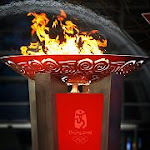
The Old China Ways are broken and Marxism have failed. The Dalai Lama is not unclear. Non-violence has not worked so far. The new way is confrontation and resistance.
Gloom descends on Tibet’s exiled leader
By James Blitz, Lionel Barber and Lifen Zhang
Published: May 25 2008 19:16 | Last updated: May 25 2008 19:16
The Dalai Lama has long been renowned as an optimistic and beaming figure, one who regularly breaks into infectious laughter in his encounters with the international media. But when he greets the Financial Times on the latest stage of a European tour to drum up support for the Tibetan cause, we find the 72-year old Nobel laureate in a subdued, almost black, mood, about the plight of his 6m people.
As our 45-minute interview progresses – in a hotel next to Nottingham racecourse that must seem a world away from his home in exile in northern India – he reveals an increasing sense of resignation and frustration. He says his commitment to pursuing autonomy for Tibet by peaceful means is losing the support of the younger generation of Tibetans. He says at one stage: “I no longer care whether I’m losing influence or not.”
There then follows a shrug of the shoulders under his crimson robe as we ask him how he feels about the prospects for a homeland he has not seen since 1959. “I really feel helplessness that’s all. I have done my best. For half a century I have remained a homeless man with one goal. Has my moral response to help the Tibetan people failed? OK, so it’s failed. But then I am a Buddhist. Compared to ordinary politicians, my thinking is a little bit different.”
This sense of helplessness is understandable in these difficult days, and yet 2008 ought to have provided him with a golden opportunity to extract real commitments from China on greater autonomy for Tibet. Beijing is determined to hold a successful Olympics this summer – and many Tibetans had thought this would put pressure on the Chinese authorities to make concessions.
Yet the Chinese earthquake, which has claimed at least 60,000 victims, turned China from villain to victim overnight, drying up the international well of sympathy for Tibet. China had attracted a wave of criticism, after riots erupted in Lhasa in March.
The Dalai Lama acknowledges the point. “Of course, initially, people are showing more concern over the victims of this large-scale earthquake.”
But he insists that one of the reasons Tibet is now being eclipsed is that China refuses to allow the outside world into witness the crackdown on human rights.
“The re-education [of monks] is going on. That is quite clear. There are arrests in some areas. That’s why I have always said to the international community and to the Chinese government ‘Please let more people go there and see for themselves what is happening’.”
The Dalai Lama clutches at one strand of hope. In its determination to keep Tibet calm in the run-up to the Olympics, Beijing has agreed to hold talks next month with his representatives about the region’s future. The Dalai Lama is suspicions of Beijing’s motives, of course. “Is this only being done for the Olympics or is to deal with the real situation of Tibet?” he asks. “I do not know.”
Still, he has a range of requests, starting with fair trials for demonstrators arrested in the Lhasa riots. As far as a political settlement is concerned, he insists he is not seeking full independence for Tibet, just “realistic autonomy”. Nor is he demanding autonomy for a far larger swath of territory, encompassing the 4m ethnic Tibetans living elsewhere in China.
However, he insists China must give enhanced rights to Tibetans wherever they live. “What we are seeking is genuine implementation of the rights of the [Tibetan] minorities. They are facing of elimination of their culture and language. We are acting on behalf of all of them.”
Whatever happens at next month’s talks, tensions with the Chinese leadership will remain high. And yet he shows understanding for the conservative line on Tibet of the Chinese president and prime minister.
“I feel sympathy for Hu Jintao and Wen Jiabao,” he says. “They have a country of over 1bn people with a lot of complications. There are still wounds from the Cultural Revolution and then another generation has the wounds of Tiananmen. There is a lot of corruption.
“China is today such a complicated country. The old Chinese tradition is much damaged and Marxism has failed. So it’s a very difficult period. As a result, the Chinese leadership is more cautious. That is realistic and it is understandable.”
However, he will not hide the hurt that he feels at the verbal ferocity with which China assaults him. “If some Chinese officials feel it is appropriate to call me a ‘demon’ or a ‘wolf with a robe’, that’s perfectly all right. But what about the millions of innocent young Chinese? If they really feel the Dalai Lama is a demon, then I feel very sad.”
Interview by James Blitz, Lionel Barber and Lifen Zhang


No comments:
Post a Comment